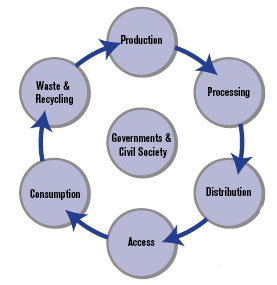 “There will be 219,000 people at the dinner table tonight who were not there last night— many of them with empty plates.” – L.R. Brown1
“There will be 219,000 people at the dinner table tonight who were not there last night— many of them with empty plates.” – L.R. Brown1
Think about that for a minute… Every single day on average there are more than two hundred thousand more mouths to feed than the previous day. That’s eighty million more people each year. One might assume then, based on that information, that human population growth is the biggest challenge facing the global world food system ecology. Taking a more in-depth look at systems theory really helps to unfold, evaluate, and contrast the world food system—and its correlation to human and environmental health—in terms of apolitical individualization versus collective progress or “political ecology”. We can distinctly see that there is an inescapable interconnectedness of multiple systems that constitute on overall system, one subjective to political and sociocultural traditions, trends, and changes as well as adaptive cycles and feedback loops.2 Managing food-production resource usage will require extensive reform if there should be any hope of sustainability and avoidance of even worse global crises.
The industrialized system, in terms of food economy, is failing us as a species. Although population growth is an immense challenge concerning food, there is perhaps a greater challenge. The majority of greenhouse gases emission and resource consumption is done by the global wealthy and middle class, and those are of course the ones who will also always be fed. The earth’s ecological sustainability would not level out even with a population growth leveling because levels of human consumption do not directly correlate to human populations. An obvious example of this is how much the average American uses from the earth compared to someone from, say, Kiribati. Their footprint is what ultimately affects the global ecology (environmentally, politically, and socially).
Much of the approach to analyzing the industrialized food system has been from a mechanical systems and reductionist perspective—looking at resource extraction, food production, distribution, and consumption in terms of input and output data and postulating that whole [system] is a sum of its parts. Looking at our relationship to food (both individually and collectively, locally and globally) in that objective, “inorganic” way often leads to ineffective policy reform and/or social movements. However, when approaching a study of the world food system with consideration that it is mostly comprised of many living, organic systems—which includes the ecology surrounding each stage of food from farming to government initiatives to consumption to waste—one realizes that emphasizing an onus of individual choice and behavior will not effectively solve world food-consumer problems such as sustainability, nutrition, and environmental pollution.
If there is to be any solution to the challenge of continued population growth and the world food system, it would entail widespread reform of the wealthier populations, and taking queues from less-industrialized societies to feed more naturally while using less (less land, less water, less nonrenewable resources for processing and transportation and storage). And I say naturally as opposed to the attempt that has been made already in the West to feed more with less, which gave us our current overabundance of processed foods with non-sustainable nutritive content (or lack thereof).
“As our collective perception of environmental problems has become more global, our prevailing way of framing environmental problem-solving has become more individualized. In the end, individualizing responsibility does not work…” writes Michael Maniates.3 In other words, your individual choice to buy organic produce and recycle every juice bottle will not ‘save the world’. It is of course a responsible thing to do, but the “think globally, act locally” mode requires a shift to “think and act globally” to see real change and steps towards solutions and sustainability in the political ecology of the world food system.
